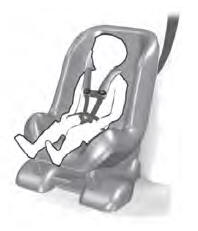Lincoln Aviator: Front Suspension - RWD / Description and Operation - Front Suspension - Overview
Overview
The RWD front suspension consists of the following components:
- Front and rear lower arms
- Rear lower arm ball joints
- Stabilizer bar, bushings and links
- Ride height sensors (Vehicles with Continuously Controlled Damping (CCD) Suspension)
- Passive or dynamically controlled shock absorber and spring assembly (Continuously Controlled Damping (CCD))
- Upper control arms
- Wheel bearings and wheel hubs
- Wheel knuckles
- Wheel studs
The front suspension uses a double ball joint short long arm suspension system. This independent-type suspension incorporates a coil over shock assembly. The shock and spring assembly carries the sprung weight of the vehicle. This system uses the front upper control arm for the upper (unloaded) pivot point of the steering knuckle or spindle, and the front and rear lower control arms for the lower (loaded) pivot points.
The wheel hub and wheel bearing are sealed units and are serviced as assemblies. The rear lower ball joint is integrated into the front wheel knuckle and is serviced as part of that wheel knuckle assembly, also the front lower ball joint is integrated into the front lower arm and is serviced as part of that assembly.
The vehicle has available Continuously Controlled Damping (CCD) Suspension. The semi-active suspension damping provides improved handling, comfort and stability by continuously adjusting the adaptive shock absorber force to the current road and driving conditions. Sensors constantly monitor the vehicle’s suspension motion, body movement, steering and braking.
Refer to: Vehicle Dynamic Suspension - Overview (204-05 Vehicle Dynamic Suspension, Description and Operation).
Refer to: Vehicle Dynamic Suspension - Vehicles With: Air Suspension - Overview (204-05 Vehicle Dynamic Suspension, Description and Operation).
 Removal and Installation - Front Lower Arm
Removal and Installation - Front Lower Arm
Special Tool(s) /
General Equipment
204-592Separator, Lower Arm Ball JointTKIT-2006C-FFMFLMTKIT-2006C-LMTKIT-2006C-ROW
Vehicle/Axle Stands
Removal
NOTICE:
Suspension fasteners are critical parts that affect the
performance of vital components and systems...
Other information:
Lincoln Aviator 2020-2026 Service Manual: Specifications
General Specifications Item Specification Base and Reserve without trailer tow vehicles Rating 220 amps Generator amps at 80.6°F (27°C) 98.1 amps at 625 rpm (min) to 180 amps at 2,500 rpm (max) Generator pulley ratio 2...
Lincoln Aviator 2020-2026 Service Manual: Removal and Installation - Front Door Window Regulator Motor
Removal NOTE: Left hand (LH) shown, right hand (RH) similar. NOTE: For front door window regulator motors that are non-functional it may be necessary to remove the front door window regulator motor prior to securing the front door window glass...
Categories
- Manuals Home
- Lincoln Aviator Owners Manual
- Lincoln Aviator Service Manual
- USB Port and Power Point Locations
- Locking and Unlocking
- Tire Change Procedure
- New on site
- Most important about car
Child Seats

Use a child restraint (sometimes called an infant carrier, convertible seat, or toddler seat) for infants, toddlers and children weighing 40 lb (18 kg) or less (generally four-years-old or younger).
Using Lap and Shoulder Belts
WARNING: Do not place a rearward facing child restraint in front of an active airbag. Failure to follow this instruction could result in personal injury or death.

